人教版新目标八年级英语下册Unit3第一课时教案设计知识讲解
- 格式:doc
- 大小:51.01 KB
- 文档页数:7

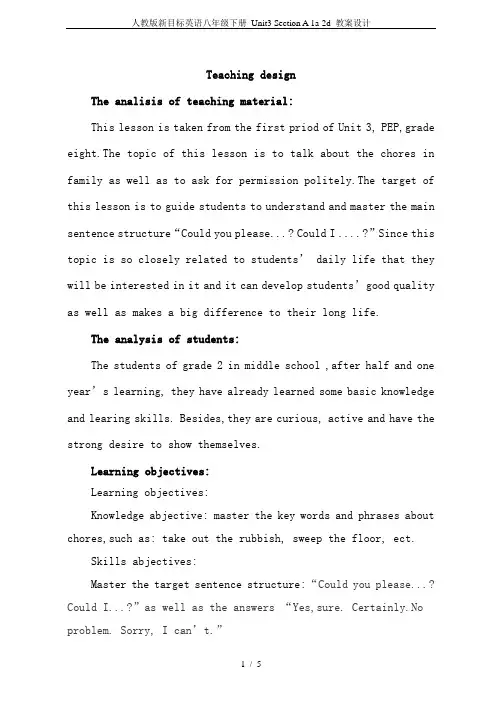
Teaching designThe analisis of teaching material:This lesson is taken from the first priod of Unit 3, PEP,grade eight.The topic of this lesson is to talk about the chores in family as well as to ask for permission politely.The target of this lesson is to guide students to understand and master the main sentence structure“Could you please...? Could I ....?”Since this topic is so closely related to students’ daily life that they will be interested in it and it can develop students’good quality as well as makes a big difference to their long life.The analysis of students:The students of grade 2 in middle school ,after half and one year’s learning, they have already learned some basic knowledge and learing skills. Besides,they are curious, active and have the strong desire to show themselves.Learning objectives:Learning objectives:Knowledge abjective: master the key words and phrases about chores,such as: take out the rubbish, sweep the floor, ect.Skills abjectives:Master the target sentence structure:“Could you please...? Could I...?”as well as the answers “Yes,sure. Certainly.No problem. Sorry, I can’t.”Emotional abjectives:Develop students’sense of responsibility and the sense of politeness.Key points of this lesson:1.Master the key worsd and phrases about chores.2.Learn to ask for resquests and permissions politely3.Improve the listening skillsDifficult points of this lesson:1.Master the target sentence structure“Could you pleasw...? Could I ...?”2.Learn to how to answer others’requests and permissions politely.Teaching methods:I mainly use the task-based language teaching and communicative language teaching methods in this lesson.And I will try my best to make students to be the host in class.Teaching procedures:Step 1 Warm-upI will ask students to read the title together“Could you please clean your room?”Then I will show students the objectives of this lesson,which includes the kowledge objective, skills objective and emotonal objective with the help of Objective Tree.Next, I will ask students the question“Could you please clean your room?”Step 2 PresentationI will use pictures to present students the target words and phrases,such as take out the rubbish, sweep the floor ,etc. Meanwhile, I will help students to understand the details like paying attention to the characteristics of “rubbish”as well as “take out”.Besides, I will lead students to read the phrases together, which aims to make students to master the corret pronunciation of each phrases.Step 3 Practice(A guessing game)I will ask students to look at the blackboard to guess what kind of chores that the people are doing in the pictures. The people are the students in our class.This activity motivates students greatly and it can make students review what they have learned just now greatly.They seem to be more interested in it.Step 4 PresentationI will ask students the question that “Who does the most housework in your family? If your mother are tired, who will she ask to help her? How can she say politely?”I will show students three kinds of sentence structures to them which one is the most polite. Then I will ask students to make conversations using thesentence structure and the pictures on the screen.Could you please....?Yes, sure. No problem. Of course. My pleasure.....Sorry, I can’t.Step 5 ListeningStudents should listen to the tape and finish the exercise in 1b.And they should report their answers using the complete sentences“Peter’s mother will.... Peter will...”Step 6 Group workTo be a monitorStudents should work in groups and choose a leader as the monitor.The monitor should arrange the activities on the duty day.They should make conversations using the sentence structure they have just learned. Next, I will pick up several groups to share their works.And I will give them some points to congratulate their good job.Step 7 ListeningStudents should liaten to the tape and finish the exercise in 2a. Then I will play it one more time and ask students to finish the exercise in 2b.Step 8 PresentationI will play the tape once again and ask students to look atthe listening material. And then I’d like them to find out the sentences to ask for permissions. Finally, I will lead students to summarise the structure about asking for permissions.Could I ....?Yes, you can. No,you can’t.Step 9 Group workStudents should work in groups to suppose they are Peter and Peter’ father and make conversations about the information in 2a and 2b.Three groups will be invited to share their works and I will give them some points to congratulate them.Step 10 Role-play the conversationFirst, I will play the tape and ask students to read after it one sentence by one sentence.Then I will ask students to role play it,that is, girls are sister and boys are brother.Finally, I will help them to understand some key points, such as help out with a few things, any minute now.......Step 11 exercisesStep 12 SummaryI will use the objective tree to help students to review what they have learned in this class.Step 13 Homework。
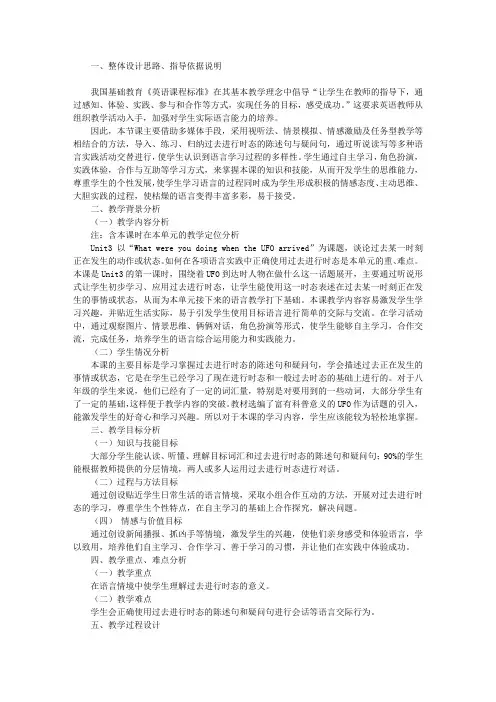
一、整体设计思路、指导依据说明我国基础教育《英语课程标准》在其基本教学理念中倡导“让学生在教师的指导下,通过感知、体验、实践、参与和合作等方式,实现任务的目标,感受成功。
”这要求英语教师从组织教学活动入手,加强对学生实际语言能力的培养。
因此,本节课主要借助多媒体手段,采用视听法、情景模拟、情感激励及任务型教学等相结合的方法,导入、练习、归纳过去进行时态的陈述句与疑问句,通过听说读写等多种语言实践活动交替进行,使学生认识到语言学习过程的多样性。
学生通过自主学习,角色扮演,实践体验,合作与互助等学习方式,来掌握本课的知识和技能,从而开发学生的思维能力,尊重学生的个性发展,使学生学习语言的过程同时成为学生形成积极的情感态度、主动思维、大胆实践的过程,使枯燥的语言变得丰富多彩,易于接受。
二、教学背景分析(一)教学内容分析注:含本课时在本单元的教学定位分析Unit3以“What were you doing when the UFO arrived”为课题,谈论过去某一时刻正在发生的动作或状态。
如何在各项语言实践中正确使用过去进行时态是本单元的重、难点。
本课是Unit3的第一课时,围绕着UFO到达时人物在做什么这一话题展开,主要通过听说形式让学生初步学习、应用过去进行时态,让学生能使用这一时态表述在过去某一时刻正在发生的事情或状态,从而为本单元接下来的语言教学打下基础。
本课教学内容容易激发学生学习兴趣,并贴近生活实际,易于引发学生使用目标语言进行简单的交际与交流。
在学习活动中,通过观察图片、情景思维、俩俩对话,角色扮演等形式,使学生能够自主学习,合作交流,完成任务,培养学生的语言综合运用能力和实践能力。
(二)学生情况分析本课的主要目标是学习掌握过去进行时态的陈述句和疑问句,学会描述过去正在发生的事情或状态,它是在学生已经学习了现在进行时态和一般过去时态的基础上进行的。
对于八年级的学生来说,他们已经有了一定的词汇量,特别是对要用到的一些动词,大部分学生有了一定的基础,这样便于教学内容的突破。
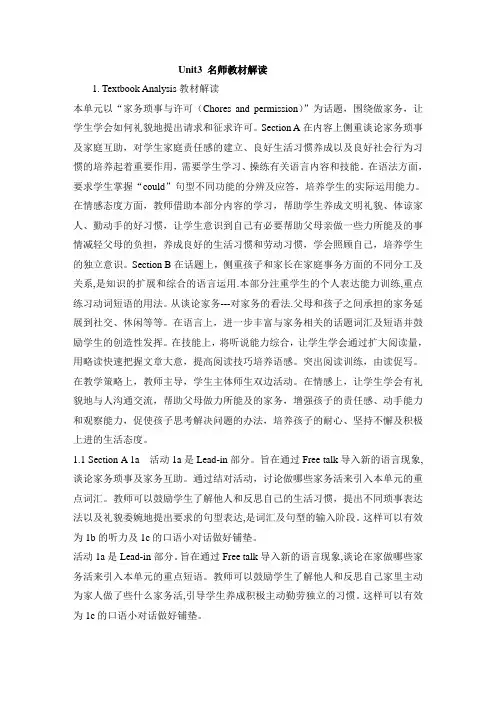
Unit3 名师教材解读1. Textbook Analysis教材解读本单元以“家务琐事与许可(Chores and permission)”为话题,围绕做家务,让学生学会如何礼貌地提出请求和征求许可。
Section A在内容上侧重谈论家务琐事及家庭互助,对学生家庭责任感的建立、良好生活习惯养成以及良好社会行为习惯的培养起着重要作用,需要学生学习、操练有关语言内容和技能。
在语法方面,要求学生掌握“could”句型不同功能的分辨及应答,培养学生的实际运用能力。
在情感态度方面,教师借助本部分内容的学习,帮助学生养成文明礼貌、体谅家人、勤动手的好习惯,让学生意识到自己有必要帮助父母亲做一些力所能及的事情减轻父母的负担,养成良好的生活习惯和劳动习惯,学会照顾自己,培养学生的独立意识。
Section B在话题上,侧重孩子和家长在家庭事务方面的不同分工及关系,是知识的扩展和综合的语言运用.本部分注重学生的个人表达能力训练,重点练习动词短语的用法。
从谈论家务---对家务的看法.父母和孩子之间承担的家务延展到社交、休闲等等。
在语言上,进一步丰富与家务相关的话题词汇及短语并鼓励学生的创造性发挥。
在技能上,将听说能力综合,让学生学会通过扩大阅读量,用略读快速把握文章大意,提高阅读技巧培养语感。
突出阅读训练,由读促写。
在教学策略上,教师主导,学生主体师生双边活动。
在情感上,让学生学会有礼貌地与人沟通交流,帮助父母做力所能及的家务,增强孩子的责任感、动手能力和观察能力,促使孩子思考解决问题的办法,培养孩子的耐心、坚持不懈及积极上进的生活态度。
1.1 Section A 1a 活动1a是Lead-in部分。
旨在通过Free talk导入新的语言现象,谈论家务琐事及家务互助。
通过结对活动,讨论做哪些家务活来引入本单元的重点词汇。
教师可以鼓励学生了解他人和反思自己的生活习惯,提出不同琐事表达法以及礼貌委婉地提出要求的句型表达,是词汇及句型的输入阶段。
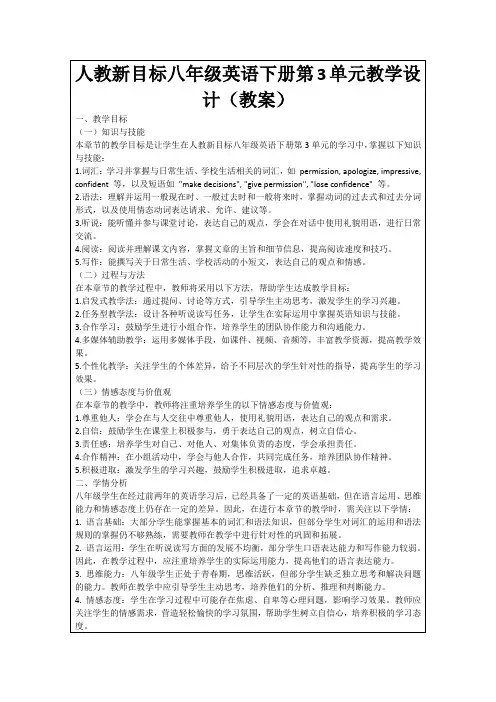
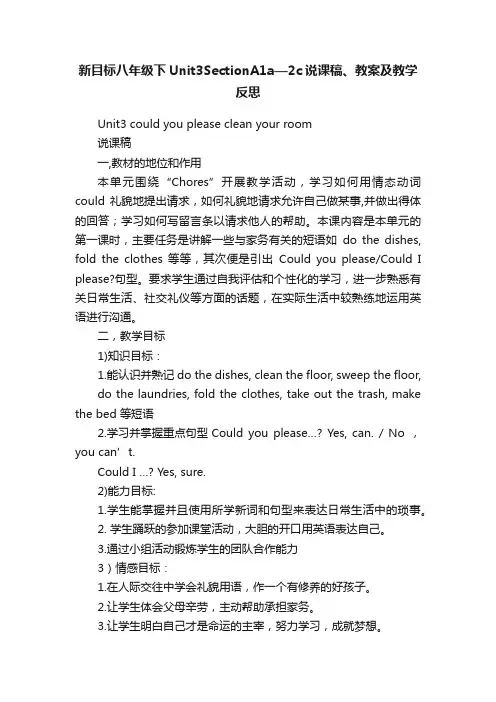
新目标八年级下Unit3SectionA1a—2c说课稿、教案及教学反思Unit3 could you please clean your room说课稿一,教材的地位和作用本单元围绕“Chores”开展教学活动,学习如何用情态动词could 礼貌地提出请求,如何礼貌地请求允许自己做某事,并做出得体的回答;学习如何写留言条以请求他人的帮助。
本课内容是本单元的第一课时,主要任务是讲解一些与家务有关的短语如do the dishes, fold the clothes 等等,其次便是引出Could you please/Could I please?句型。
要求学生通过自我评估和个性化的学习,进一步熟悉有关日常生活、社交礼仪等方面的话题,在实际生活中较熟练地运用英语进行沟通。
二,教学目标1)知识目标:1.能认识并熟记do the dishes, clean the floor, sweep the floor,do the laundries, fold the clothes, take out the trash, make the bed 等短语2.学习并掌握重点句型Could you please…? Yes, can. / No ,you can’t.Could I …? Yes, sure.2)能力目标:1.学生能掌握并且使用所学新词和句型来表达日常生活中的琐事。
2. 学生踊跃的参加课堂活动,大胆的开口用英语表达自己。
3.通过小组活动锻炼学生的团队合作能力3)情感目标:1.在人际交往中学会礼貌用语,作一个有修养的好孩子。
2.让学生体会父母辛劳,主动帮助承担家务。
3.让学生明白自己才是命运的主宰,努力学习,成就梦想。
三教学重点和难点教学重点:1 掌握新单词,正确使用本课所学短语和固定搭配。
2 掌握Could you please??和Could I??两个重要句型以及其正确礼貌回答方式。
教学难点:1 正确使用本课所学短语和固定搭配。
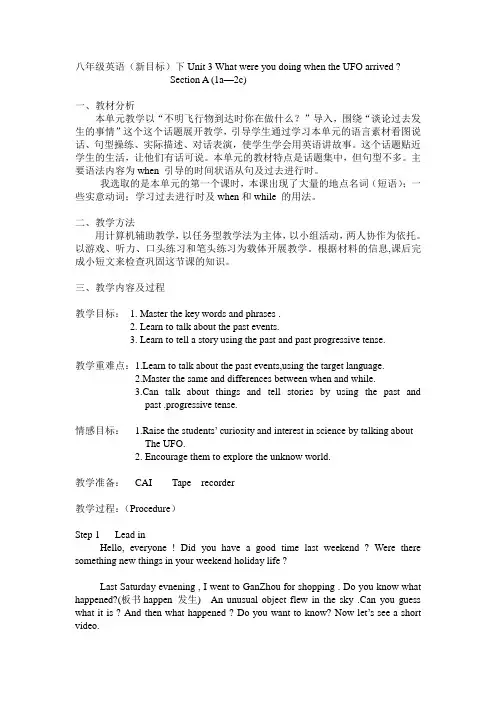
八年级英语(新目标)下Unit 3 What were you doing when the UFO arrived ?Section A (1a—2c)一、教材分析本单元教学以“不明飞行物到达时你在做什么?”导入,围绕“谈论过去发生的事情”这个这个话题展开教学,引导学生通过学习本单元的语言素材看图说话、句型操练、实际描述、对话表演,使学生学会用英语讲故事。
这个话题贴近学生的生活,让他们有话可说。
本单元的教材特点是话题集中,但句型不多。
主要语法内容为when 引导的时间状语从句及过去进行时。
我选取的是本单元的第一个课时,本课出现了大量的地点名词(短语);一些实意动词;学习过去进行时及when和while 的用法。
二、教学方法用计算机辅助教学,以任务型教学法为主体,以小组活动,两人协作为依托。
以游戏、听力、口头练习和笔头练习为载体开展教学。
根据材料的信息,课后完成小短文来检查巩固这节课的知识。
三、教学内容及过程教学目标:1. Master the key words and phrases .2. Learn to talk about the past events.3. Learn to tell a story using the past and past progressive tense.教学重难点:1.Learn to talk about the past events,using the target language.2.Master the same and differences between when and while.3.Can talk about things and tell stories by using the past andpast .progressive tense.情感目标: 1.Raise the students’ curiosity and interest in science by talking about The UFO.2. Encourage them to explore the unknow world.教学准备:CAI Tape recorder教学过程:(Procedure)Step 1 Lead inHello, everyone ! Did you have a good time last weekend ? Were there something new things in your weekend holiday life ?Last Saturday evnening , I went to GanZhou for shopping . Do you know what happened?(板书happen 发生) An unusual object flew in the sky .Can you guess what it is ? And then what happened ? Do you want to know? Now let’s see a short video.Step 2 Presentation1.Show the video again for the class , and teach new words:UFO (Unidentified Fly Object 不明飞行物飞碟)n.alien (外星人)n.land (登陆)v.2.Show out the statements of 2a by CAI3.Play the tape,listen and order these statements[1-5], then read thesentences.4.Now let’s see where alien was going .(Present new phrases and sentencestructures.)Show 6 pictures of real situation about where the alien was.Teach new vocabulary and sentence structures.A: Where was the alien?(point to picture 1)B: It was in the bathroomA: Where was was the alien?(picture2)B: It was in the kitchen(lead student say other pictures, and at the same time wtite these new phrases on the blackboard ).Students finish 1a.Read these vocabulary after the teacher ,then students read together.[Can you ask and answer like me ?(point the big screem, let students practice above dialogues)]5. Later, I did a survey about where my friends were when the UFO arrived?1. cut hair (Lucy) in a barber shop2.Cook dinner(Kate) in the kitchen3. cut hair(Tom) in the barber’s chair4.Sleep (Jim) in the bedroom5. Talk on the phone (Allen) in front of library6. Take a shower(Tina) in the bathroomPresent (lead student say)A:Where was Lucy when the alian landed?B: She was in the barber’s shop when the alien landed.(practice other people as this)A: And what was Allen doing when the alien landed?B: He was talking on the phone in front of the library when the alien landed.(lead student say out others like this)Sum up: past progressive tense ( was/were + doing) 过去某一时刻或某一时段正在进行的动作。
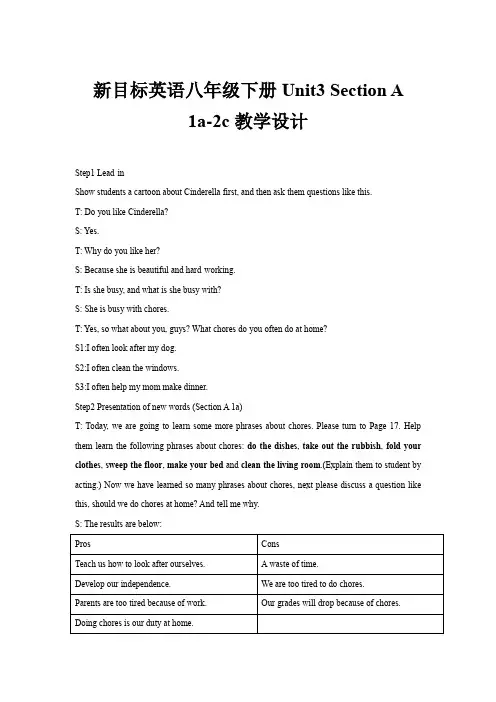
新目标英语八年级下册Unit3 Section A1a-2c教学设计Step1 Lead-inShow students a cartoon about Cinderella first, and then ask them questions like this.T: Do you like Cinderella?S: Yes.T: Why do you like her?S: Because she is beautiful and hard-working.T: Is she busy, and what is she busy with?S: She is busy with chores.T: Yes, so what about you, guys? What chores do you often do at home?S1:I often look after my dog.S2:I often clean the windows.S3:I often help my mom make dinner.Step2 Presentation of new words (Section A 1a)T: Today, we are going to learn some more phrases about chores. Please turn to Page 17. Help them learn the following phrases about chores: do the dishes, take out the rubbish, fold your clothes, sweep the floor, make your bed and clean the living room.(Explain them to student by acting.) Now we have learned so many phrases about chores, next please discuss a question like this, should we do chores at home? And tell me why.S: The results are below:T: Guys, I think we should do chores at home, because our parents are so tired that they can’t work all day and do chores all evening. We should share housework with them. So love your parents, help them do chores!Next, do a game to review the new phrases.T: Guys, ask me questions like this, Does he/ she …?S: Does he/ she…?T: Yes, he/ she does. or No, he/ she doesn’t.Step3 Presentation of the listening (Section A 1b)T: Now, listen to the tape, and tell me what Peter’s mother does and what Peter does at home.Step4 Presentation of new sentences about how to make a request (Section A 1c)How to make a request politely?A: Could you please …?B: Yes, sure. / All right. / No problem.Sorry, I can’t. I have to…/ I am going to…Pair work 1:T: Make your own conversation using these sentences in pairs.A1: Could you please lend me your book?B1: Yes, sure. Here you are.A2: Could you please lend me some money?A2: No, I can’t. I have no money.Pair work 2:Show them a picture about a messy room, and ask them like this: If your mom comes into yourroom like this, what should she ask? And then practice the sentences below:A1: Could you please fold your clothes?B1: Yes, sure. / All right. / No problem.A2: Could you please sweep the floor?B2: Sorry, I can’t. I have to do my homework./ I am going to do my homework.Step5 Presentation of new sentences about how to ask for permission (Section A 2c)Show them pictures about the roles in <Cinderella>.T: Now, Cinderella wants to go to the party, and dance with the prince. What should she ask her step-mother for permission?S: Step-mother, could I go to the party?T: What about fairy god-mother?S: God-mother, could I go to the party?Group work1:Role-play a conversation.A: Step-mother, could I go to the party?B: No, you can’t. You should do the dishes, sweep the floor, clean the living room and so on.A: Oh, so much housework! Fairy god-mother, could I go to the party?C: Yes, sure. I can make you more beautiful.The sentences about how to ask for permissionsA: Could I …?B: Yes, sure./All right./No problem.No, you can’t. You have to.../ Sorry, you can't. You…Step6 Presentation of the listening (Section A 2a&2b)Step7 Pair work3A1: Could I go to the cinema?B1: Yes, sure./All right./No problem.A2: Could I Play basketball?B2: No, you can’t. You have to fold your clothes.Step8 ConsolidationT: Imagine that we are going to go camping on Saturday morning. Are you happy? Now, you and your friends should sit down and talk about the preparations with each other. Please make your own conversation using the key words.A: Hey, guys. We are going to go camping on Saturday morning. Let’s talk about the preparations. B, could you please bring a tent for us.B: No, I can’t. I don’t have so much money. Could we raise money for it?A: Yes, sounds great. C, could you please bring drinks and food for us?C: No problem. I can bring some milk, juice, beef, pork and mutton.A: Great! We can BBQ by the river. And we can also invite some friends to join us.Step9 Homework1. Help your parents do some chores at home.2. Write a conversation between you and your parent about doing chores at home.新目标英语八年级下册Unit3 Could you please clean your room?Section A 1a-2c学情分析新目标英语八年级上册Unit9 Can you come to my party? 这一单元,学生们已经学会使用Can you...?句型礼貌地提出邀请及接受邀请或礼貌地拒绝邀请并给出适当理由的句型。
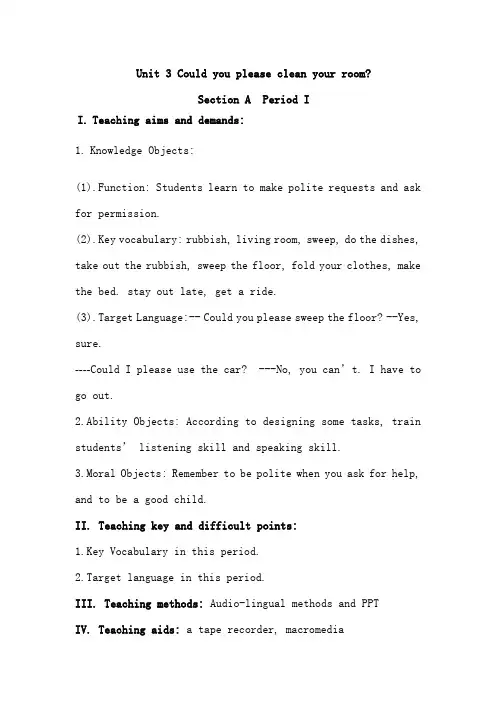
Unit 3 Could you please clean your room?Section A Period II.Teaching aims and demands:1.Knowledge Objects:(1).Function: Students learn to make polite requests and ask for permission.(2).Key vocabulary: rubbish, living room, sweep, do the dishes, take out the rubbish, sweep the floor, fold your clothes, make the bed. stay out late, get a ride.(3).Target Language:-- Could you please sweep the floor? --Yes, sure.----Could I please use the car? ---No, you can’t. I have to go out.2.Ability Objects: According to designing some tasks, train students’ listening skill and speaking skill.3.Moral Objects: Remember to be polite when you ask for help, and to be a good child.II. Teaching key and difficult points:1.Key Vocabulary in this period.2.Target language in this period.III. Teaching methods: Audio-lingual methods and PPTIV. Teaching aids: a tape recorder, macromediaV. Teaching procedure:Step 1. Revision &Warming-up1. Greetings2. Ask and answer between the teacher and the students. Who is the busiest in your family, your father ,your mother or yourself? Why?What chores does your mother do at home?3. Show students some pictures about chores and learn the new words and phrases:clean the room ,dish ,do the dishes ,sweep, sweep the floor ,make the bed ,rubbish ,take out the rubbish ,fold ,fold the clothesStep 2. Presentation1.Activity1a. How many chores do you usually do at home? Then ask and answer in pairs about the chores. Do you usually do the chores?2.Activity 1b ListeningNow look at the chart. There are three columns here, Chores, Mom and Peter. Listen to the tape and answer: What chores does Peter’s mom do? What chores does Peter do? And finish the chart. Check the answers with the students.Step 3:PairworkBefore working in pairs, students should review the informationabout the chores in the picture and the expressions of the chores in 1a. After that, ask students to practice the conversation with the target language. Then follow the sample dialogue to make conversations with their partners:A: Could you please sweep the floor?B: Yes, sure. (by performing the action)A: Could you please do the dishes?B: Sorry, I can’t. I have to do my homework.The teacher moves around the classroom and give some help as needed.Step 4: Listening1.Activity 2a.The teacher asks students to be familiar with the content of the chart and think about the situation that is: everyone need some help or give some help. if someone can’t give any help, he must be reasonable. Now play the recorder and let students to check what Peter’s father says, “Yes” or “No”with “√” by listening to the tape.2.Activity 2b. The teacher asks students to look at the chartin 2a, and be familiar with the content of the chartto make sure they should know what to do .Then ask students to listen to the tape and draw lines to the reasons why Peter’s father says “no” in the chart above. Then check the answers with students.Step 5: PracticeStudent A acts as Peter and asks if he can do the things Student B acts as Peter’s father saying “yes” or “no”. If student B says “no”, he should give a reason. According to the information in the chart in 2a, students make a dialogue to start oral practice using the targetlanguage and following the sample like this:A: Could I please use your computer?B: Sorry. I’m going to work on it now.A: Well, could I watch TV?B: Yes, you can. But first you have to clean your room. (Finish 2c)Step 6:SummaryThis lesson ,we have learnt some new words and phrases about chores .And we also have learnt how to express :make polite requests and ask for permission.Step 7:Homework1. List all the main phrases of doing chores that you know.2. Make a conversation between you and your partner, using the sentence pattern “Could you please …?”Blackboard Design:Unit 3 Could you please clean your room?Period I (1a---2c)1.New vocabulary:do the dishes, sweep the floor ,take out the rubbish, make the bed ,fold the clothes, clean the living room ,stay out late, get a ride2.Make polite requests: ---Could you please…?---Yes, sure./ Sorry, I can’t.3.Ask for permission:----Could I please...?---No, you can’t .I have to ...。
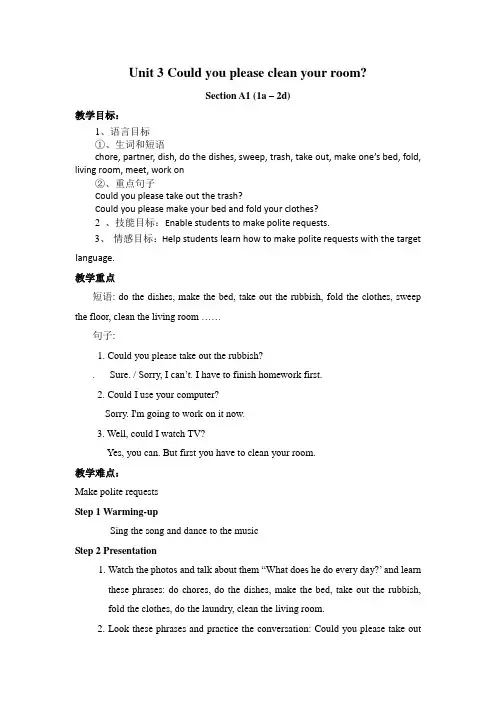
Unit 3 Could you please clean your room?Section A1 (1a – 2d)教学目标:1、语言目标①、生词和短语chore, partner, dish, do the dishes, sweep, trash, take out, make one’s bed, fold, living room, meet, work on②、重点句子Could you please take out the trash?Could you please make your bed and fold your clothes?2 、技能目标:Enable students to make polite requests.3、情感目标:Help students learn how to make polite requests with the target language.教学重点短语: do the dishes, make the bed, take out the rubbish, fold the clothes, sweep the floor, clean the living room ……句子:1. Could you please take out the rubbish?. Sure. / Sorry, I can’t. I have to finish homework first.2. Could I use your computer?Sorry. I'm going to work on it now.3. Well, could I watch TV?Yes, you can. But first you have to clean your room.教学难点:Make polite requestsStep 1 Warming-upSing the song and dance to the musicStep 2 Presentation1. W atch the photos and talk about them “W hat does he do every day?’ and learnthese phrases: do chores, do the dishes, make the bed, take out the rubbish, fold the clothes, do the laundry, clean the living room.2. Look these phrases and practice the conversation: Could you please take outthe rubbish? Sure. / Sorry, I can’t. I have to finish homework first.3. 1a Do you do these chores at home? Discuss them with your partner.Step 3 Listening1b Listen. Who will do these chores? Check (√) Peter’s mother or Peter.Step 4 Practice1c Make conversations about the chores in 1a.Make conversations.ExamplesA: Could you please...?B: Yes, sure. /All right. /No problem./Certainly.Sorry, I can't. I have to do...Sorry, I can't. I am doing...Step 5 Listening 2a&2bPeter asks his father if he can do four things. What does his father say? Check (√) “yes” or “no”. Listen again. Draw lines to the reasons.Step 6 Practice2c Make conversations using the information in 2a and 2bA: Could I use your computer?B: Sorry. I’m going to work on it now.A: Well, could I watch TV?B: Yes, you can. But first you have to clean your room?2d Role –play the conversationStep 7 Language points and summary1. Tony, could you please help out with a few things?help out 动词短语,表示在某人繁忙或遇到困难时“给予帮助”。
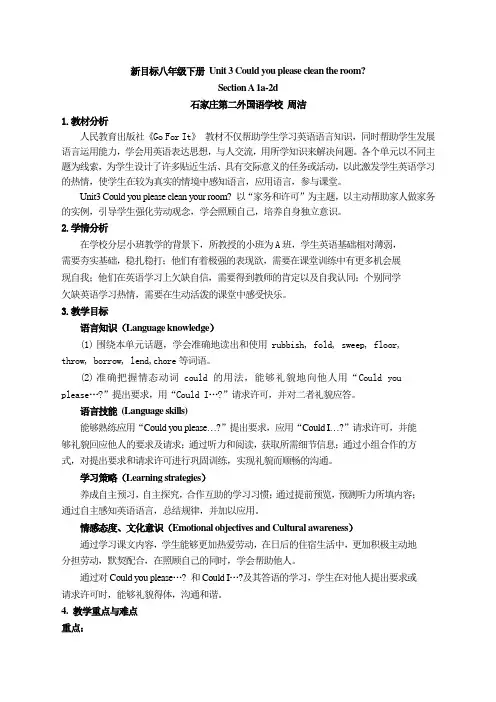
新目标八年级下册Unit 3 Could you please clean the room?Section A 1a-2d石家庄第二外国语学校周洁1.教材分析人民教育出版社《Go For It》教材不仅帮助学生学习英语语言知识,同时帮助学生发展语言运用能力,学会用英语表达思想,与人交流,用所学知识来解决问题。
各个单元以不同主题为线索,为学生设计了许多贴近生活、具有交际意义的任务或活动,以此激发学生英语学习的热情,使学生在较为真实的情境中感知语言,应用语言,参与课堂。
Unit3 Could you please clean your room? 以“家务和许可”为主题,以主动帮助家人做家务的实例,引导学生强化劳动观念,学会照顾自己,培养自身独立意识。
2.学情分析在学校分层小班教学的背景下,所教授的小班为A班,学生英语基础相对薄弱,需要夯实基础,稳扎稳打;他们有着极强的表现欲,需要在课堂训练中有更多机会展现自我;他们在英语学习上欠缺自信,需要得到教师的肯定以及自我认同;个别同学欠缺英语学习热情,需要在生动活泼的课堂中感受快乐。
3.教学目标语言知识(Language knowledge)(1)围绕本单元话题,学会准确地读出和使用rubbish, fold, sweep, floor, throw, borrow, lend,chore等词语。
(2)准确把握情态动词could的用法,能够礼貌地向他人用“Could you please…?”提出要求,用“Could I…?”请求许可,并对二者礼貌应答。
语言技能(Language skills)能够熟练应用“Could you please…?”提出要求,应用“Could I…?”请求许可,并能够礼貌回应他人的要求及请求;通过听力和阅读,获取所需细节信息;通过小组合作的方式,对提出要求和请求许可进行巩固训练,实现礼貌而顺畅的沟通。
学习策略(Learning strategies)养成自主预习,自主探究,合作互助的学习习惯;通过提前预览,预测听力所填内容;通过自主感知英语语言,总结规律,并加以应用。
Unit 3 Could you please clean your room?教学设计Section A 1a—2d一、教学目标在本节课结束时,学生将能够:掌握家务琐事有关的词汇和短语;礼貌地提出要求和向别人征询许可。
(一)知识与能力1.学习并掌握一些家务琐事的词汇和短语(chore, rubbish, fold, floor, mess, take out therubbish, sweep the floor)。
2.学会用could礼貌地提出要求(Could for polite requests)。
3.学会用could征询许可(Could for permission)。
(二)过程与方法采用任务型教学方法进行自主学习、小组合作探究、和Role play的学习策略,利用教学图片、幻灯片等来展开课堂教学、通过Pair work的口语交际形式礼貌提出要求和向别人征询许可;通过小组Role play的形式,让学生在真实语境中体会所学,教师检测学生是否能够恰当得体地运用语言。
1a-1c从听说技能入手,呈现、学习不同琐事表达法及礼貌、委婉地提出要求的句型表达,为词汇及句型结构的输入阶段;2a-2d突出听、说技能训练,在发现语言技能的同时,练习、巩固此前学习的词汇和表达,并介绍、操练征询许可的句型结构,让学生将礼貌地提出要求和征询许可两种功能进行综合操练、运用。
(三)情感态度与价值观通过谈论家务琐事及家庭互助,培养学生生活习惯、社会行为习惯的养成,帮助学生建立家庭责任感。
二、教学重难点(一)教学重点1.学习与家务琐事相关的词汇短语;2.学习礼貌地提出要求和向别人征询许可;3.训练在听力过程中抓住关键词的技能。
(二)教学难点1.学会准确使用Could礼貌地提出要求和征询许可。
2.学会准确回答别人的要求和许可。
三、教学策略语音教学─让学生能在朗读或对话中正确读出各项家务琐事;词汇教学─采取图片,word bank方式进行帮助学生记忆,让学生在情境中操练、理解含义,并学会运用;口语教学──采取pair work, role play的口语交际活动和小组活动操练和让学生体验语言运用;听力教学──采取听后挑选,连线,回答问题等方式;设计贴近学生生活情景的活动对目标语言进行训练。
新目标八年级英语下册Unit3What were you doing when the UFO arrived ?教学设计一、背景新目标初中英语教材采用任务型语言教学(TASK-BASED LANGUAGE TEACHING)模式,融会话题、交际功能和语言结构,形成一套循序渐进的生活话的学习程序。
以学生语言技能、语言知识、情感态度、学习策略和文化意识的发展为基础,培养学生英语综合语言运用能力。
强调从学生的学习兴趣、生活经验和认知水平出发,倡导学生体验、实践、参与和交流来中发展学生的综合语言运用能力。
二、课题:八年级英语(新目标)下Unit 3 What were you doing when the UFO arrived ?Section A (1a—2c)三、教材分析本单元教学以“不明飞行物到达时你在做什么?”导入,围绕“谈论过去发生的事情”这个这个话题展开教学,引导学生通过学习本单元的语言素材看图说话、句型操练、实际描述、对话表演,使学生学会用英语讲故事。
这个话题贴近学生的生活,让他们有话可说。
四、教学方法以游戏、听力、口头练习和笔头练习为载体开展教学。
根据材料的信息,课后完成小短文来检查巩固这节课的知识。
五、教学内容及过程教学目标:1. Master the key words and phrases .2. Learn to talk about the past events.教学重难点:1.Learn to talk about the past events,using the target language.2.Master the same and differences between when and while.情感目标: 1.Raise the students’ curiosity and interest in science by talking aboutThe UFO.2. Encourage them to explore the unknow world.教学准备:Tape recorder教学过程:(Procedure)Step 1 Lead inHello, everyone ! Did you have a good time last weekend ? Were there something new things in your weekend holiday life ?Step 2 Presentation1.Show the video again for the class , and teach new words:UFO (Unidentified Fly Object 不明飞行物飞碟)n.alien (外星人)n. land (登陆)v.2.Play the tape,listen and order these statements[1-5], then readthe sentences.3.Now let’s see where alien was goi ng .(Present new phrases andsentence structures.)A: Where was the alien?(point to picture 1)B: It was in the bathroomA: Where was was the alien?(picture2)B: It was in the kitchen Students finish 1a.Read these vocabulary after the teacher ,then students read together.[Can you ask and answer like me ?(point the big screem, letstudents practice above dialogues)]Step 3 Practice1.Can you tell me about what you or your friends were doing?(Students practice this sentence structures by themsvlve, two or four in a group.)Like this : A: hello! Where were you when the UFO arrived?B: I was +地点C: I was +地点D: I was +地点A: What were you doing when the UFO arrived ?B: I was +(doing)……C: I was +(doing)……D: I was +(doing)……A: where was your friend (某某)when the UFO arrived?B: He/She was +地点A: What was youe friend …doing when the alien landed?B: He/She was +(doing)……A: Where were your parents when the UFO arrived?B: She was + 地点A: What were your parents doing when the alien landed?B: They were +(doing)……2. Promt some pairs or groups to act out.3. Play gamesShow 6 pictures ( 6 gold eggs). If you want to play this game ,you could choose one of these 6 eggs, and then I will open your egg which you pick out, and here will some information in it .You should use the information (have been write on )to make conwersations.3. Listen to the tape and finish 1b ,then check the answers. And read the conversation .4.T ry to complete 2b with “when”and “while”.Students can see grammar focus first. And then play the tape for students to , and check their answers.5. Play the tape again and the studeuts read sentence by sentence after the tape. Pay attentation to the pronunciatin and intonation.Then read together by imitating .Step 4 Consolidation1.Students look at 2b and grammar focus , see the same and thedifferences between when and while .3.Do some exercises.①Lucy was playing the guitar (when/while)her mother was cleaning the house.②The students were cleaning the classroom (when/while) the teacher came in.③(when/while) Cathy was playing the guitar,the other girlslistened and kept quiet.Step 5 homework. After class please finish the following passage . And review today’s knowledge.六、教学反思1、通过看外星人登入的视屏来导入新课,使学生对学习充满兴趣并感受英语学习的乐趣,从而营造良好的课堂氛围。
新目标八年级英语下册Unit 3教学设计Unit 3教学设计一、教学内容及分析本单元以生活中发生的有趣事情及富有科普意义的不明飞行物UF作为话题,其语言功能是谈论过去发生的事情,学会讲故事,进而培养学生热爱科学、探索科学、热爱生活的情感。
是在学习了一般过去时态和现在进行时态的基础上,通过讲故事的方式,学习过去进行时态,继续巩固一般过去时态,学习hen、hile引导的时间状语从句,进而加深对一般过去时态和过去进行时态意义的理解和应用。
Setin A:活动1a至2主要通过听说的方式,描述UF的发生过程,在情景中呈现并学习了过去进行时态的意义及其结构,学习了hen和hile引导的时间状语从句。
活动3a至活动4通过读写的方式,通过任务驱动,讲述了UF故事的结尾,然后通过小组交流活动,应用巩固过去进行时态。
Setin B:在Setin A的基础上进一步升华,应用前面学习的知识谈论学生身边常发生的事情,增强语言的真实实用性,教材编排按照先听说后读写循序渐进的方式,便于学生掌握和巩固。
Self he目的是检测重点词汇、目标语言的应用,是学生单元复习和小结的指南。
教材以循序渐进的方式逐步呈现、操练、巩固、提高和复习新的语言,通过任务驱动的方式,从生活中,到生活中去,体现语言的工具性和交际性。
听、说、读、写贯穿整个学习过程,让学生体验合作交流的学习方式,感受语言学习之乐。
二、学习者特征分析本单元的主要目标是学习掌握过去进行时态,巩固应用一般过去时态,学会讲故事或描述身边发生的事情,它是在学生已经学习了现在进行时态和一般过去时态的基础上继续学习的。
对于八年级的学生,学生已经有了一定的词汇量,特别是要用好多的动词,学生有了一定的基础,这样便于教学内容的突破;更好的是教材选编了一些富有科普意义的UF,更能激发学生的好奇心和学习兴趣,所以本单元的学习,学生应该能轻松的掌握。
三、单元整体目标分析1、知识与能力:(1)、Vabular(词汇)A、Ne rds and phrases barber shp,bathr,bedr,ithen,UF,alien,experiene,aident,utting hair,libing,uping,shuting,land,get ut f,tae ff,fll,happen,sared,strange,aazingB、Reling shp,stre,librar,superaret,useu,TV statin,plie,b,girl,reprter,alled,t a pht,eating lunh,rded(2)、Graar(语法)A、Strutures(语言结构)Adverbial lause ith hen,hile Questins and stateents ith past prgressiveRevie Past tenseB、Target language(目标语言)hat ere u ding hen the UF arrived?I as sitting in the barber’s hairThe barber as utting hairhile he as buing a suvenir, a girl alled the plie(3)、Funtins(功能)T al abut past events Tell a str2、过程与方法本单元通过听说读写各种活动,了解了UF,学习了UF的故事发生过程,巩固掌握一般过去时态和过去进行时态,能够讲述或者复述故事,描述自己身边发生的事情。
新⽬标英语⼋年级下册unit3第⼀课时新⽬标英语⼋年级下册unit3第⼀课时王欢各位评委⽼师,⼤家好!今天我说课的内容是⼈教版《新⽬标英语》⼋年级上册Unit 3what were you doing when the UFO arri ved? 我将从以下⼏个⼤⽅⾯来谈⼀下我本节课的设计。
⼀、教材分析:本课是新⽬标⼋年级下册unit3第⼀课时。
本单元的话题是“in teresting events”通过单元学习,要求学⽣掌握如何如使⽤过去时态谈论过去发⽣的事情,并能运⽤过去时态讲述⼀个故事。
语法结构要求掌握由when和while引导的时间状语从句、过去进⾏时以及⼀般过去时。
为了让学⽣更好的认识过去进⾏时,我重新安排了教学内容:SectionA(1a、1b、1c), SectionB (4b). 把这些内容组合在⼀起。
同时我也创造了⼀些便于进⾏沟通交流的情境,让学⽣学会使⽤过去进⾏时。
重点句型有:1.I was standing in front of the library when t he ufo landed.2.while the alien was buying a key ring, I called the police.3.what were you doing at 11:30am last Sunday morning?本单元((⼀)图⽂并茂。
⼀幅幅充满情趣,幽默⽣动的画⾯,令学⽣眼睛⼀亮。
(⼆)实⽤性强。
每个选材都来源于学⽣的学习和⽣活,与学⽣的年龄特征、认知结构、⽣活经验密切联系。
(三)注重交际。
针对中国学⽣学英语普遍存在的“聋哑病”,设计了⼤量的听说读写材料以及活动。
让学⽣在课堂上⼤胆说⼤胆练!⼆、教学⽬标:1. 知识⽬标:要求学⽣掌握使⽤过去进⾏时。
2. 能⼒⽬标:让学⽣做课堂的主⼈,同时培养他们掌握⼀些⾏之有效的学习⽅法,优化课堂学习效果。
3. 情感⽬标:让学⽣爱上英语课堂活动,⿎励他们在课堂上进⾏合作交流。
教案一、背景新目标初中英语教材采用任务型语言教学(TASK-BASED LANGUAGE TEACHING)模式,融会话题、交际功能和语言结构,形成一套循序渐进的生活话的学习程序。
以学生语言技能、语言知识、情感态度、学习策略和文化意识的发展为基础,培养学生英语综合语言运用能力。
强调从学生的学习兴趣、生活经验和认知水平出发,倡导学生体验、实践、参与和交流来中发展学生的综合语言运用能力。
增加了情感因素、学习策略以及文化意识和跨文化交际能力等方面,体现了以人为本的教育观念,培养学生的终生学习能力,培养学生健全的人格和技能发展能力,提到了教育成功的核心。
任务型的教学模式,其过程应该形成一种师生交往、积极互动、共同发展的过程。
应该形成一种民主、开放的课堂教学氛围。
让学生在教师的指导下,通过感知、体验、实践、参与和合作等方式,实现任务的目标,感受成功。
在学习过程中进行情感和策略调整,以形成积极的学习态度,促进语言实际运用能力的提高。
二、课题:八年级英语(新目标)下Unit 3 What were you doing when the UFO arrived ?Section A (1a—2c)三、教材分析本单元教学以“不明飞行物到达时你在做什么?”导入,围绕“谈论过去发生的事情”这个这个话题展开教学,引导学生通过学习本单元的语言素材看图说话、句型操练、实际描述、对话表演,使学生学会用英语讲故事。
这个话题贴近学生的生活,让他们有话可说。
本单元的教材特点是话题集中,但句型不多。
主要语法内容为when 引导的时间状语从句及过去进行时。
我选取的是本单元的第一个课时,本课出现了大量的地点名词(短语);一些实意动词;学习过去进行时及when和while 的用法。
四、教学方法用计算机辅助教学,以任务型教学法为主体,以小组活动,两人协作为依托。
以游戏、听力、口头练习和笔头练习为载体开展教学。
根据材料的信息,课后完成小短文来检查巩固这节课的知识。
五、教学内容及过程教学目标:1. Master the key words and phrases .2. Learn to talk about the past events.3. Learn to tell a story using the past and past progressive tense.教学重难点:1.Learn to talk about the past events,using the target language.2.Master the same and differences between when and while.3.Can talk about things and tell stories by using the past andpast .progressive tense.情感目标: 1.Raise the students’ curiosity and interest in science by talking about The UFO.2. Encourage them to explore the unknow world.教学准备:CAI Tape recorder教学过程:(Procedure)Step 1 Lead inHello, everyone ! Did you have a good time last weekend ? Were there something new things in your weekend holiday life ?Last Saturday evnening , I went to GanZhou for shopping . Do you know what happened?(板书happen 发生) An unusual object flew in the sky .Can you guess what it is ? And then what happened ? Do you want to know? Now let’s see a short video.Step 2 Presentation1.Show the video again for the class , and teach new words:UFO (Unidentified Fly Object 不明飞行物飞碟)n.alien (外星人)n.land (登陆)v.2.Show out the statements of 2a by CAI3.Play the tape,listen and order these statements[1-5], then read thesentences.4.Now let’s see where alien was going .(Present new phrases and sentencestructures.)Show 6 pictures of real situation about where the alien was.Teach newA: Where was the alien?(point to picture 1)B: It was in the bathroomA: Where was was the alien?(picture2)B: It was in the kitchen(lead student say other pictures, and at the same time wtite these new phrases on the blackboard ).Students finish 1a.Read these vocabulary after the teacher ,then students read together.[Can you ask and answer like me ?(point the big screem, let students practice above dialogues)]5. Later, I did a survey about where my friends were when the UFO arrived?1. cut hair (Lucy) in a barber shop2.Cook dinner(Kate) in the kitchen3. cut hair(Tom) in the barber’s chair4.Sleep (Jim) in the bedroom5. Talk on the phone (Allen) in front of library6. Take a shower(Tina) in the bathroomPresent (lead student say)A:Where was Lucy when the alian landed?B: She was in the barber’s shop when the alien landed.(practice other people as this)A: And what was Allen doing when the alien landed?B: He was talking on the phone in front of the library when the alien landed.(lead student say out others like this)Sum up: past progressive tense ( was/were + doing) 过去某一时刻或某一时段正在进行的动作。
Step 3 Practice1.Can you tell me about what you or your friends were doing? (Students practicethis sentence structures by themsvlve, two or four in a group.)Like this : A: hello! Where were you when the UFO arrived?B: I was +地点C: I was +地点D: I was +地点A: What were you doing when the UFO arrived ?B: I was +(doing)……C: I was +(doing)……D: I was +(doing)……A: where was your friend (某某)when the UFO arrived?B: He/She was +地点…………A: What was youe friend …doing when the alien landed?B: He/She was +(doing)………………A: Where were your parents when the UFO arrived?B: She was + 地点…………A: What were your parents doing when the alien landed?B: They were +(doing)………………2. Promt some pairs or groups to act out.3. Play gamesShow 6 pictures ( 6 gold eggs). If you want to play this game ,you could choose one of these 6 eggs, and then I will open your egg which you pick out, and here will some information in it .You should use the information (have been write on )to make conwersations.3. Listen to the tape and finish 1b ,then check the answers. And read the conversation .4.Try to complete 2b with “when”and “while”.Students can see grammar focus first. And then play the tape for students to , and check their answers.5. Play the tape again and the studeuts read sentence by sentence after the tape. Pay attentation to the pronunciatin and intonation.Then read together by imitating .Step 4 Consolidation1.Students look at 2b and grammar focus , see the same and the differences betweenwhen and while .2.Lead students find out their differences3.Make up sentences4.Do some exercises.①Lucy was playing the guitar (when/while)her mother was cleaning the house.②The students were cleaning the classroom (when/while) the teacher came in.③(when/while) Cathy was playing the guitar,the other girls listened and keptquiet.④What were you doing (when/while)Mum came back from work?⑤(when/while)I was doing my homework,someone knocked at the door.Step 5 Summary and homeworkToday we have learnt some new things about the UFO and alien. And some knowledge about new words, short phrases, new sentence structures,past progressivetense . And the differences between when and while. After class please finish the following passage . And review today’s knowledge.My bad day (writing)(sleep,ring)→(go out of home,rain) →(watch TV,was broken) →(play computer games,the electic power cut(停电)) →(sleep,ring again).Last Sunday, I had a bad day. In the morning I was sleeping whenthe telephone rang, my friend Tom asked me to have a picnic with him., .I had to stay at home..Then I thought of my computer, ,the Electirc power cut. I had nothing to do. I slept again .六、教学反思针对上述教学设计和具体的教学活动,笔者事后又一下几点思考:一、好的方面1、飞碟和外星人对于学生来说是新鲜事物,通过看外星人登入的视屏来导入新课,使学生对学习充满兴趣并感受英语学习的乐趣,从而营造良好的课堂氛围。